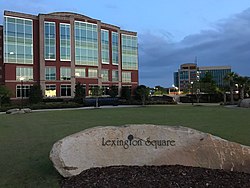Lexington, SC
| Lexington, South Carolina | |
|---|---|
| Town | |
 |
|
| Motto: "Building Partnerships" | |
| Location of Lexington, South Carolina | |
| Coordinates: 33°58′52″N 81°13′51″W / 33.98111°N 81.23083°WCoordinates: 33°58′52″N 81°13′51″W / 33.98111°N 81.23083°W | |
| Country | |
| State |
|
| County | Lexington County |
| Government | |
| • Type | Mayor-Council |
| • Body | Lexington Town Council |
| • Mayor | Steve MacDougall |
| Area | |
| • Town | 8.8 sq mi (22.97 km2) |
| • Land | 8.7 sq mi (22.95 km2) |
| • Water | 0.1 sq mi (0.2 km2) |
| Elevation | 394 ft (120 m) |
| Population (2010) | |
| • Town | 17,870 (Lexington Limits) |
| • Rank | 23rd |
| • Density | 2,014/sq mi (778/km2) |
| • Metro | 82,769 (Sub-County) |
| Time zone | Eastern (EST) (UTC-5) |
| • Summer (DST) | EDT (UTC-4) |
| ZIP codes | 29071, 29072, 29073 |
| Area code(s) | 803 |
| FIPS code | 45-41335 |
| GNIS feature ID | 1246349 |
| Website | www |
Lexington is the largest town in and the county seat of Lexington County, South Carolina, United States. Lexington is a suburb of the state's capital and second-largest city, Columbia. The U.S. Census Bureau estimated 2016 population is 24,905, and it is the second-largest municipality in the Columbia, South Carolina metropolitan area.
In 1735, the colonial government of King George II established eleven townships in backcountry South Carolina, to encourage settlement, and to provide a buffer between Native American tribes to the West and colonial plantations in the Lowcountry. The townships included one named Saxe Gotha, which flourished with major crops of corn, wheat, tobacco, hemp, and flax, as well as beeswax and livestock.
The Battle of Tarrar Springs was fought nearby on November 16, 1781. In 1785, Saxe Gotha was replaced with Lexington County, in commemoration of the Battles of Lexington and Concord in Massachusetts. The county's first courthouse was built in Granby, but chronic flooding forced the courthouse to move in 1820 to its present location, establishing the community of Lexington Courthouse. The community was incorporated as the Town of Lexington in 1861.
In 1865 Union Army forces destroyed the courthouse and many buildings in the town. But local farms and the lumber industry helped stabilize the economy after Reconstruction. The town grew due to the Columbia to Augusta Railroad and the Lexington Textile Mill, constructed in 1890.
Many current brick buildings were built in the aftermath of severe fires in 1894 and 1916.
The Move Over Law, a law that requires drivers to change lanes when there is a stopped emergency vehicle on the side of the road, originated in Lexington, SC, after a South Carolina Paramedic, James D. Garcia, was struck and injured at an accident scene on Jan. 28, 1994. Garcia was listed at fault, leading to his work to create this law. SC's version (SC 56-5-1538) passed in 1996, and was revised in 2002.
...
Wikipedia

